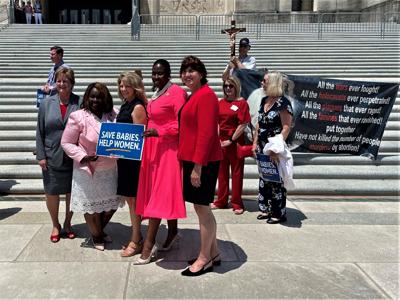A federal judge has dismissed a lawsuit against a Louisiana state senator by two residents who claimed she violated their First Amendment rights when she blocked them on the social media platform X, after one made an insulting and vulgar post over abortion laws, and another disagreed with a plan to start the school day with the Lord’s Prayer.
New Orleans resident Maya Detiege sued state Sen. Katrina Jackson-Andrews, a Democrat from Monroe, in February 2023, arguing that a post she made was protected political speech and that the senator’s social media account was a public forum subject to First Amendment protection, according to the lawsuit.
In blocking users from her Twitter account over a policy disagreement, Jackson-Andrews violated Detiege’s constitutional right to free speech, the plaintiff argued.
Jackson, however, said in court filings that her Twitter posts didn’t count as official government activity — a stance that U.S. District Judge Donald Walter agreed with.
Walter said the plaintiffs had not proven Jackson “had actual authority to speak on the State’s behalf,” and thus didn’t have the right to sue over constitutional rights violations.
The plaintiffs plan to appeal the decision, said Bruce Hamilton, a professor with the Tulane University Law School First Amendment Clinic who is representing the plaintiffs.
“We respectfully disagree with the judge’s interpretation of state authority in this case, Hamilton said. “Senator Jackson was clearly using and continues to use her social media platform to speak in furtherance of her official responsibilities.”
“X is the modern public square — our elected officials should not be allowed to block users from viewing and interacting with their social media accounts because they express critical or dissenting points of view,” he added.
Jackson-Andrews on Monday said she is “thanking God” for the ruling that an “elected official's personal account cannot be subjected to vile and racist statements.”
Fierce criticism over abortion
Detiegue’s June 24, 2022 post came the day that the U.S. Supreme Court overturned Roe v. Wade and a federal right to abortion.
She was responding to a post from Jackson-Andrew noting that Roe v. Wade had been overturned and calling for support of “women and children from womb to tomb.”
Jackson-Andrews opposes abortion and that year sponsored a bill making changes to Louisiana’s abortion trigger law, which immediately banned abortion in the state when the Supreme Court overturned Roe.
One of the social media posts central to the case came from Detiegue. It said: “I say this with all disrespect: burn in hell. You don’t care about women. You don’t care about pregnant people. You don’t care about children. You don’t care about education. I do not respect all black women. Some of you b***es are very dumb.”
Another plaintiff, Ponchatoula resident Dayne Sherman, joined the lawsuit several months after it was originally filed. Jackson-Andrews blocked him from her account in 2013 after a disagreement over the legality of a bill she sponsored that year to allow public schools to start the day with the Lord’s Prayer, according to court filings.
Louisiana Attorney General Liz Murrill, whose office helped represent Jackson-Andrews in the case, celebrated the outcome, saying in a statement that “The First Amendment did not prohibit Sen. Jackson from blocking vile, personal, racist attacks on her social media pages.”
Walter, a federal judge in the Western District of Louisiana nominated by President Ronald Reagan, in his ruling cited a 2024 U.S. Supreme Court decision in the case Lindke v. Freed. That case dealt with a similar issue with a city manager in Michigan who posted personal and work-related information on a social media account and blocked a user who was critical of the city’s pandemic response.
In Lindke, the high court held that a public official’s social media activity is considered official state government action if that official had “actual authority to speak on the State’s behalf” and then “purported to exercise that authority when he spoke on social media,” Walter explained in his ruling.
Walter said the Louisiana plaintiffs failed to meet the bar set out in that case.

